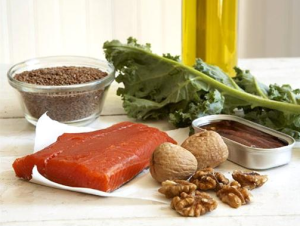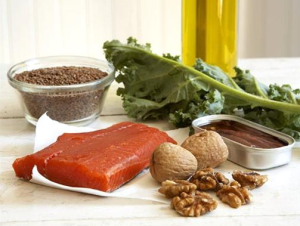If you want to get the most nutrition possible from your diet, then don’t miss out on the most overlooked nutrient that is vital to our health. I’m referring to omega-3 fatty acids, essential fatty acids that the body does not produce making it incredibly important that you get these nutrients through food.
Omega-3 fatty acids are a collection of polyunsaturated fatty acids, including eicosapentaenic acid (EPA) and docosahexanoic acid (DHA), found in fish, and alpha-linolenic acid (ALA), which is found in plants. Unlike the saturated fats in foods like butter and meat, which can raise levels of unhealthy (LDL) cholesterol, polyunsaturated fats are healthier because they help lower cholesterol levels and reduce inflammation throughout the body.
Research increasingly shows that getting omega-3 fatty acids reduce inflammation in the body therefore assists in lowering the risk of chronic diseases such as arthritis, certain cancers, and heart disease. These healthy fats can also assist with brain memory and performance as these fatty acids are highly concentrated in the brain. Symptoms of omega-3 fatty acid deficiency include fatigue, poor memory, dry skin, heart problems, mood swings or depression, and poor circulation.
Here is a list of foods that you can add to your diet in an effort to increase your intake of this incredibly important nutrient:
• Fatty Fish – Salmon (900-1800 mg per 3oz serving), lake trout (1700 mg), herring and halibut. Aim for 2 servings weekly. Try this Quinoa Salmon Patty Recipe for lunch or dinner!
• Seed up – ground flaxseeds, chia seeds, hemp seeds, and pumpkin seeds are all great sources of omega-3 fatty acids. Sprinkle them on yogurt, add them to oatmeal or smoothies or bake them into your baked goods. Try this easy breakfast smoothie recipe.
• Enriched eggs- done by adding flaxseed or algae to the diets of egg-producing hens. These specialty eggs contain about 60-150 milligrams of omega-3s per egg.
• Walnuts-great source of ALA (2600 mg in 1oz) can be sprinkled in salads, oatmeal, and even added to baked goods.
• Cauliflower – is great for cardiovascular health due to omega-3 and vitamin K. They’re also a great source of potassium, magnesium, and niacin. Just 100g of cauliflower contains 210mg of omega-3. Try this cauliflower pizza for a delicious way to enjoy cauliflower.
• Brussel sprouts – contain 1/3 of ALA DRV and make a great side dish for lunch or dinner. Try this Oven Roasted Brussel Sprouts recipe!







Add comment